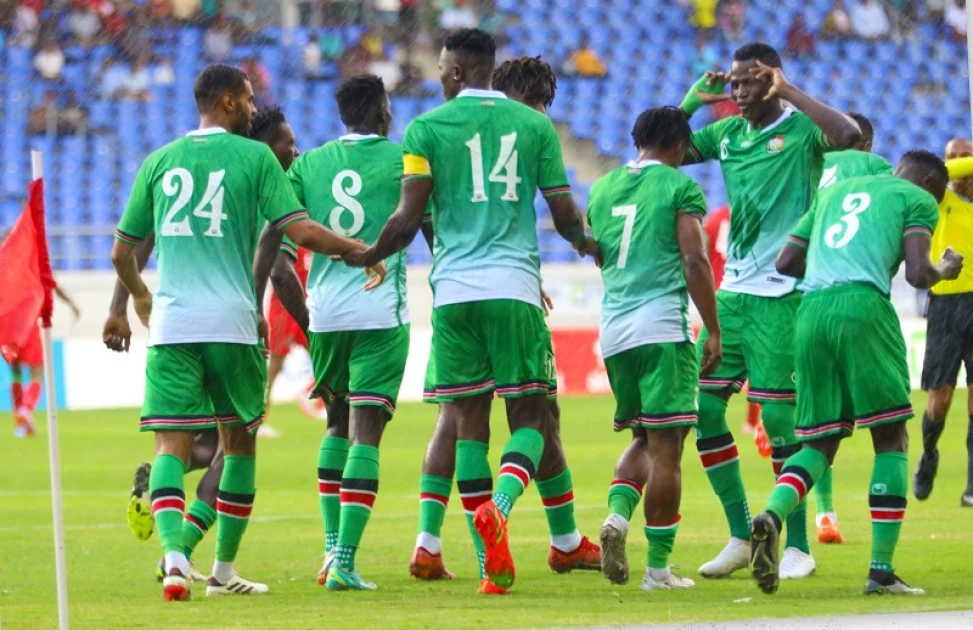Kenya’s national football team, the Harambee Stars, will play their Africa Cup of Nations (AFCON) 2025 qualifier against Zimbabwe in Uganda on September 4. This decision comes as a result of the unavailability of a CAF-certified stadium within Kenya, marking the third consecutive home match the Harambee Stars will have to play outside their own borders. The situation has left both players and fans frustrated, especially in light of recent promises by government officials that the necessary facilities would be ready in time.
Just a month ago, Sports Principal Secretary (PS) Eng. Peter Tum assured the nation that Nyayo Stadium would be prepared to host not only the AFCON qualifiers but also other significant CAF continental matches. However, ongoing renovations at both Nyayo Stadium and the Kasarani Sports Complex have rendered these venues unusable for the time being. The renovations are part of Kenya’s broader preparations to host the 2025 African Nations Championship (CHAN) and the 2027 Africa Cup of Nations (AFCON), events that require world-class facilities.
The issue of inadequate stadiums is not unique to Kenya; it is a widespread problem across the African continent. Over 25 countries are currently without certified stadiums that meet CAF and FIFA standards, forcing many national teams to seek alternative venues abroad. This has raised concerns about the overall infrastructure of African football and the need for more robust investments to meet international standards.
For the Harambee Stars, the inability to play on home soil is more than just an inconvenience—it’s a significant disadvantage. Earlier this year, the team was forced to play two World Cup 2026 qualifiers against Burundi and Ivory Coast at the Bingu National Stadium in Malawi. The absence of home support was palpable, and the team struggled to find their rhythm. Despite a strong effort, Kenya managed only a 1-1 draw against Burundi and a 0-0 draw against the reigning AFCON champions, Ivory Coast.
Captain Michael Olunga, one of Kenya’s most prominent footballers, expressed his disappointment with the situation. He highlighted the importance of home fans in boosting the team’s morale and performance. “Our fans play a big part in supporting and motivating us during home matches. The home advantage also gives us the edge over our opponents. Hopefully, we get Nyayo or Kasarani ready before the September AFCON qualifiers,” Olunga said after the draw against Ivory Coast. His sentiments reflect the broader frustration felt by both players and fans, who see the lack of proper facilities as a major hurdle to the team’s success.
Kenya’s AFCON campaign will continue with another challenge, as their second group J qualifier against Namibia is also scheduled to be played away from home. Namibia, facing similar stadium certification issues, will host the match in South Africa on September 10. The logistical challenges of constantly playing away from home are beginning to take a toll on the team, both physically and mentally.
The Football Kenya Federation (FKF) has acknowledged the difficulties posed by the ongoing stadium renovations and the broader infrastructure challenges facing Kenyan football. In a recent communiqué, the FKF revealed that the Police Sacco and Ulinzi pitches, which have been used for domestic matches, are also slated for renovations ahead of CHAN 2025. This will make them unavailable for FKF Premier League matches, further exacerbating the shortage of playable venues.
In light of these challenges, the FKF has urged clubs to explore other venues within the country for their home matches. These venues include Moi Stadium in Embu, Moi Kinoru Stadium in Meru, Kirigiti Stadium in Kiambu, Siaya Stadium in Siaya, Waiguru Stadium in Kirinyaga, and Mpesa Foundation Stadium in Thika. However, these venues are smaller and may not meet the same standards as Nyayo or Kasarani, raising concerns about their suitability for high-stakes matches.
This stadium crisis also poses significant challenges for Kenya’s top football clubs, Gor Mahia and Police FC, who will need to find alternative venues outside Kenya for their upcoming CAF Champions League and Confederations Cup qualifiers later this month. The need to travel for home matches places an additional burden on these teams, affecting their preparation and potentially their performance in these critical continental competitions.
The current situation underscores the urgent need for Kenya to complete its stadium renovations and improve its sports infrastructure to avoid future disruptions. While the government’s focus on preparing for CHAN 2025 and AFCON 2027 is commendable, it is crucial that these efforts do not come at the expense of current needs. The Harambee Stars and Kenyan football as a whole stand to benefit immensely from having reliable, world-class facilities that can host both domestic and international matches.
As the Harambee Stars prepare to face Zimbabwe in Uganda, the lack of home advantage will undoubtedly be a challenge. However, with the resilience and determination that has come to define Kenyan football, the team will be looking to overcome these obstacles and secure a vital victory in their quest for AFCON 2025 qualification. The hope remains that by their next home fixture, the necessary renovations will be completed, allowing the Harambee Stars to return to where they belong—playing in front of their passionate fans on home soil.
ALSO READ:KVF Writes Off Claims of Abandonment as Malkia Strikers Return from Paris


